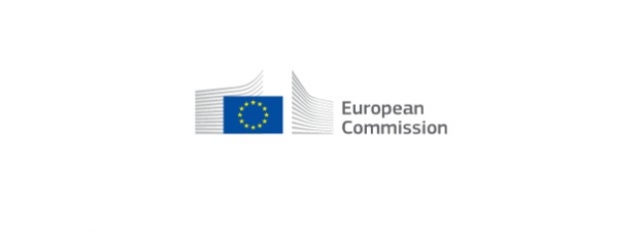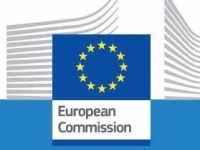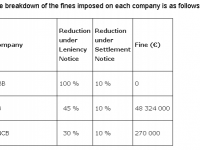Politics
Antitrust: Commission fines three EU railway companies
€48 million customer allocation cartel

(Source: © European Commission )
USPA NEWS -
Antitrust: Commission fines three EU railway companies €48 million for customer allocation cartel
The European Commission has fined railway companies Österreichische Bundesbahnen (ÖBB), Deutsche Bahn (DB) and Société Nationale des Chemins de fer belges / Nationale Maatschappij der Belgische Spoorwegen (SNCB) a total of €48 million for breaching EU antitrust rules.
The European Commission has fined railway companies Österreichische Bundesbahnen (ÖBB), Deutsche Bahn (DB) and Société Nationale des Chemins de fer belges / Nationale Maatschappij der Belgische Spoorwegen (SNCB) a total of €48 million for breaching EU antitrust rules.
The companies participated in a customer allocation cartel, which concerned cross-border rail cargo transport services on blocktrains on key rail corridors in the EU. The three companies admitted their involvement in the cartel and agreed to settle the case.
Executive Vice-President Margrethe Vestager, in charge of competition policy, said: “Rail transport of cargo is vital for a sustainable economy model. Fair competition is important to provide customers with the best offer when using sustainable transport. A cartel between key operators offering rail cargo services on essential rail corridors across the EU goes fundamentally against this objective. Today's decision sends a clear signal that this type of collusive behaviour is not acceptable.“
Executive Vice-President Margrethe Vestager, in charge of competition policy, said: “Rail transport of cargo is vital for a sustainable economy model. Fair competition is important to provide customers with the best offer when using sustainable transport. A cartel between key operators offering rail cargo services on essential rail corridors across the EU goes fundamentally against this objective. Today's decision sends a clear signal that this type of collusive behaviour is not acceptable.“
The infringement concerned cross-border rail cargo transport services in the EU provided by ÖBB, DB and SNCB under the freight sharing model and carried out in “blocktrains“.
Blocktrains are cargo trains shipping goods from one site, such as the production site of the vendor of the transported goods to another site, such us a warehouse, without being split up or stopped on the way.
Under the freight sharing model, which is a contract model foreseen in international railway law, railway companies performing cross-border rail services provide customers with a single overall price for the service required under a single multilateral contract.
Blocktrains are cargo trains shipping goods from one site, such as the production site of the vendor of the transported goods to another site, such us a warehouse, without being split up or stopped on the way.
Under the freight sharing model, which is a contract model foreseen in international railway law, railway companies performing cross-border rail services provide customers with a single overall price for the service required under a single multilateral contract.
The Commission's investigation revealed that the three railway companies coordinated by exchanging collusive information on customer requests for competitive offers and provided each other with higher quotes to protect their respective business. The companies thus participated in a customer allocation scheme, which is prohibited under EU competition rules.
The anti-competitive conduct lasted from 8 December 2008 to 30 April 2014, with SNCB participating only since 15 November 2011 and only for transports by ÖBB, DB and SNCB. The cartel concerned conventional cargo transport sectors (except automotive transports).
The anti-competitive conduct lasted from 8 December 2008 to 30 April 2014, with SNCB participating only since 15 November 2011 and only for transports by ÖBB, DB and SNCB. The cartel concerned conventional cargo transport sectors (except automotive transports).
Fines
The fines were set on the basis of the Commission's 2006 Guidelines on fines (see also MEMO).
In setting the level of fines, the Commission took into account, in particular, the sales value achieved by the cartel participants for the services in question in the EU in 2013 (the last full year of infringement), the serious nature of the infringement, the geographic scope and the duration of each undertakings participation in the infringement.
The fine for Deutsche Bahn AG was increased by 50% since it had previously been held liable for another cartel (case AT.39462 ““ Freight Forwarding) and was therefore considered a repeat offender.
The fines were set on the basis of the Commission's 2006 Guidelines on fines (see also MEMO).
In setting the level of fines, the Commission took into account, in particular, the sales value achieved by the cartel participants for the services in question in the EU in 2013 (the last full year of infringement), the serious nature of the infringement, the geographic scope and the duration of each undertakings participation in the infringement.
The fine for Deutsche Bahn AG was increased by 50% since it had previously been held liable for another cartel (case AT.39462 ““ Freight Forwarding) and was therefore considered a repeat offender.
Under the Commission's 2006 Leniency Notice:
ÖBB received full immunity, thereby avoiding an aggregate fine of ca. € 37 million.
DB and SNCB benefited from a reduction of their fines for their cooperation with the Commission during the investigation. The reduction reflects the timing of the cooperation and the extent to which the evidence provided helped the Commission to prove the existence of the cartel in which they were involved.
In addition, the Commission applied a reduction of 10% on the fines imposed under the Commission 2008 Settlement Notice in view of their acknowledgment of their participation in the cartel and of their liability in this respect.
ÖBB received full immunity, thereby avoiding an aggregate fine of ca. € 37 million.
DB and SNCB benefited from a reduction of their fines for their cooperation with the Commission during the investigation. The reduction reflects the timing of the cooperation and the extent to which the evidence provided helped the Commission to prove the existence of the cartel in which they were involved.
In addition, the Commission applied a reduction of 10% on the fines imposed under the Commission 2008 Settlement Notice in view of their acknowledgment of their participation in the cartel and of their liability in this respect.
Background
The cross-border rail cargo transport services concerned were carried out on blocktrains, that is cargo trains shipped from one site (e.g. the production site of the vendor of the transported goods) to another site (e.g. a warehouse of the purchaser of the goods) without being split up or stored on the way. Such blocktrains usually serve high-volume customers, which often carry a single commodity and run on the same unchanged destination for long periods, such as between the harbors of Rotterdam, Antwerp or Hamburg and large industrial sites in Germany and Austria, such as refineries or chemical plants.
On 15 July 2015 the Commission adopted another decision concerning rail cargo services. The Blocktrains decision (AT.40098) concerned rail cargo transport services on routes linking central Europe with South Eastern Europe (Balkantrain, Soptrain).
Procedural Background
Article 101 of the Treaty on the Functioning of the European Union (TFEU) prohibits cartels and other restrictive business practices, including collusion to allocate customers.
Procedural Background
Article 101 of the Treaty on the Functioning of the European Union (TFEU) prohibits cartels and other restrictive business practices, including collusion to allocate customers.
The Commission's investigation in this case started with an application under the Commission's 2006 Leniency Notice submitted by ÖBB, followed by applications for reduction of fines by the other parties.
Fines imposed on companies found in breach of EU antitrust rules are paid into the general EU budget. This money is not earmarked for particular expenses, but Member States' contributions to the EU budget for the following year are reduced accordingly. The fines therefore help to finance the EU and reduce the burden for taxpayers.
Fines imposed on companies found in breach of EU antitrust rules are paid into the general EU budget. This money is not earmarked for particular expenses, but Member States' contributions to the EU budget for the following year are reduced accordingly. The fines therefore help to finance the EU and reduce the burden for taxpayers.
The settlement procedure
Today's decision is the 35th cartel settlement since the introduction of this procedure for cartels in June 2008 (see press release and MEMO). In a cartel settlement, parties acknowledge their participation in a cartel and their liability for it. Cartel settlements are based on Antitrust Regulation 1/2003 and allow the Commission to apply a simplified and shortened procedure. This benefits consumers and taxpayers as it reduces costs. It also benefits antitrust enforcement as it frees up resources to tackle other suspected cartels. Finally, the parties themselves benefit in terms of quicker decisions and a 10% reduction in fines.
Today's decision is the 35th cartel settlement since the introduction of this procedure for cartels in June 2008 (see press release and MEMO). In a cartel settlement, parties acknowledge their participation in a cartel and their liability for it. Cartel settlements are based on Antitrust Regulation 1/2003 and allow the Commission to apply a simplified and shortened procedure. This benefits consumers and taxpayers as it reduces costs. It also benefits antitrust enforcement as it frees up resources to tackle other suspected cartels. Finally, the parties themselves benefit in terms of quicker decisions and a 10% reduction in fines.
Action for damages
Any person or company affected by anti-competitive conduct as described in this case may bring the matter before the courts of the Member States and seek damages. The case law of the Court and Council Regulation 1/2003 both confirm that in cases before national courts, a Commission decision constitutes binding proof that the conduct took place and was illegal. Even though the Commission has fined the cartel participants concerned, damages may be awarded without being reduced on account of the Commission fine.
Any person or company affected by anti-competitive conduct as described in this case may bring the matter before the courts of the Member States and seek damages. The case law of the Court and Council Regulation 1/2003 both confirm that in cases before national courts, a Commission decision constitutes binding proof that the conduct took place and was illegal. Even though the Commission has fined the cartel participants concerned, damages may be awarded without being reduced on account of the Commission fine.
more information: https://europa.eu/european-union/index_en
Liability for this article lies with the author, who also holds the copyright. Editorial content from USPA may be quoted on other websites as long as the quote comprises no more than 5% of the entire text, is marked as such and the source is named (via hyperlink).







